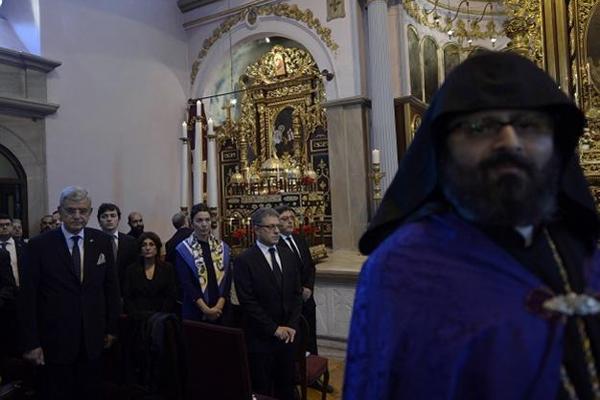Turkey shares Armenians' pain for 'sorrowful events' of 1915


The Turkish government was represented by EU Minister Volkan Bozkır (L) at the religious ceremony in Istanbul, marking a first since 1916. AA photo
President Recep Tayyip Erdoğan has said that Turkey shares the pain of the Armenian community on the centennial anniversary of the mass deportation of Ottoman Armenians, which he described as "sorrowful events."Erdoğan's message, addressed to Acting Patriarch Aram Ateşyan in Turkish, Armenian and English, was read at a religious ceremony held by the Armenian Patriarchate at Mother Mary Church in Istanbul on April 24 to honor the memory of Ottoman Armenians killed during World War I.
"Let me reiterate that we are cognizant of the sorrowful events experienced in the past by the Armenian community and that I sincerely share your pain. Please rest assured also that our hearts remain wide open to the grandchildren of the Ottoman Armenians all around the world," he said in the statement.
Erdoğan also acknowledged that the day carried "a special significance" for Turkey's Armenian citizens. "I once again respectfully commemorate all the Ottoman Armenians who lost their lives amid the conditions of the World War I and extend my condolences to their children and grandchildren," he added.
The Turkish government was represented by EU Minister Volkan Bozkır at the religious ceremony, as Erdoğan was in the Çanakkale province to attend the events marking the centennial anniversary of the Gallipoli campaign in 1915.
Call for 'just memory'
"We would like to see studies focused on the years between 1870 to 1920s, including World War I, instead of only 1915. As such, it would be possible to look at our common history and to reveal a common, just memory," Bozkır said at the event, which was officially held for the first time since 1916.
Turkey denies that the killings of Ottoman Armenians, at a time when Turkish troops were fighting Russian forces, constituted genocide. It says there was no organized campaign to wipe out Armenians and no evidence of any such orders from the Ottoman authorities.
